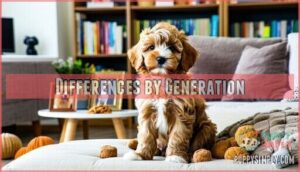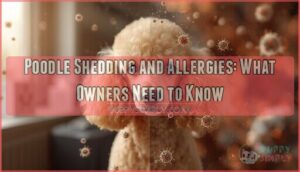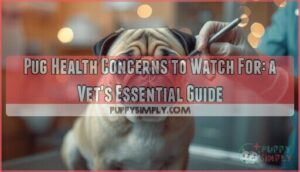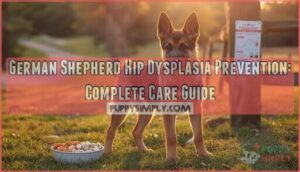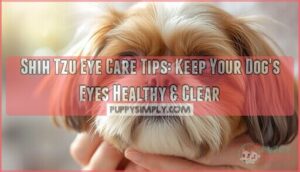This site is supported by our readers. We may earn a commission, at no cost to you, if you purchase through links.

You’ll get the Golden’s gentle temperament with the Poodle’s intelligence and low-shedding coat—perfect for families wanting goldendoodle traits in apartment-friendly size.
These dogs need 30 minutes daily exercise, live 12-15 years thanks to hybrid vigor, and adapt well to smaller living spaces.
Their wavy to curly coats come in cream, apricot, and rare parti patterns, requiring professional grooming every 6-8 weeks.
While they’re naturally social and highly trainable, mini goldendoodles can develop separation anxiety if left alone too long.
Understanding their specific generation type and health screening requirements makes all the difference in finding your ideal companion.
Table Of Contents
- Key Takeaways
- What is a Mini Goldendoodle?
- Appearance and Physical Traits
- Personality and Temperament
- Health and Lifespan
- Ownership and Care Considerations
- Frequently Asked Questions (FAQs)
- Are mini goldendoodles purebred?
- Are miniature goldendoodles good dogs?
- Are mini goldendoodles good for first time owners?
- How big is a Mini Goldendoodle?
- Are Mini Goldendoodles good dogs?
- What is the cost of a Mini Goldendoodle?
- Do Mini Goldendoodles bark a lot?
- Are Mini Goldendoodles hyper?
- How much does a mini Goldendoodle cost?
- How often should a mini goldendoodle be groomed?
- Conclusion
Key Takeaways
- You’ll get a compact 15-35 pound companion that’s perfect for apartment living while still being sturdy enough for active families with children.
- You’re investing in a highly trainable, intelligent dog that combines Golden Retriever gentleness with Poodle smarts, making them excellent for first-time owners.
- You’ll need to budget $2,000-$5,000 upfront plus ongoing costs like professional grooming every 6-8 weeks and $300-$800 annual vet expenses.
- You’re committing to 12-15 years of daily exercise (30 minutes), regular brushing, and consistent training to prevent separation anxiety in these naturally social dogs.
What is a Mini Goldendoodle?
A Mini Goldendoodle is a crossbreed between a Golden Retriever and a Miniature or Toy Poodle, first developed in 2001 to create a smaller, family-friendly companion dog.
A compact, hypoallergenic companion that combines Golden Retriever gentleness with Poodle intelligence—perfect for families seeking manageable, low-shedding pets
These designer dogs combine the Golden Retriever’s gentle temperament with the Poodle’s intelligence and low-shedding coat, resulting in a compact pet that typically weighs 15-35 pounds.
Origins and Breed History
The Mini Goldendoodle emerged in 2001 when early breeders sought a smaller, more manageable family companion.
Amy Lane of Fox Creek Farms bred the first litter on January 11, 2002, combining Golden Retrievers with Miniature Poodles.
This breed development created hybrid vigor benefits while achieving GANA acceptance, establishing the goldendoodle breed as a beloved crossbreed option.
Golden Retriever and Poodle Lineage
The mini goldendoodle’s parent breeds bring distinct genetic contributions that shape this crossbreed’s appealing characteristics.
Golden retrievers contribute their gentle temperament, intelligence, and family-friendly nature, while Miniature Poodles provide hypoallergenic coat qualities and compact size.
This breed development combines the best traits from both lineages, creating crossbreed variations that inherit the retriever’s loyalty with the poodle’s low-shedding coat.
The lineage impact results in dogs perfectly sized for families seeking a smaller, manageable companion with predictable temperamental qualities.
Understanding their growth helps owners prepare, especially knowing the average height and weight.
Generations and Crossbreeding Types
Understanding goldendoodle generations helps you predict your pup’s traits.
Each generation offers different characteristics based on parent breed percentages:
- F1 Generations combine 50% Golden Retriever with 50% Poodle genetics
- F1B involves backcrossing explained as 75% Poodle, 25% Golden Retriever mix
- F2 pairs two F1 parents, creating varied offspring combinations
- Multigen benefits include predictable traits through selective breeding practices
Hybrid vigor strengthens health outcomes while breeder ethics guarantee quality bloodlines.
Appearance and Physical Traits
Mini Goldendoodles showcase a distinctive "teddy-bear" appearance with their compact frames typically weighing 15-35 pounds and standing 13-20 inches tall.
You’ll notice significant variation in their coat colors and textures, ranging from wavy to curly patterns that inherit the Poodle’s low-shedding characteristics.
Size and Weight Range
How big will your mini goldendoodle get? Adult Size typically ranges from 13-20 inches tall and 15-40 pounds.
Genetic Influence from miniature poodle parentage creates significant Size Variations compared to standard goldendoodles.
| Generation | Weight Range | Height Range |
|---|---|---|
| F1 (50/50) | 15-35 lbs | 13-17 inches |
| F1B (75% Poodle) | 20-40 lbs | 14-18 inches |
| Multigen | 26-35 lbs | 16-20 inches |
Growth Factors include parent size and generation type, with Breed Standards varying between organizations like GANA.
Coat Types and Colors
Beyond their petite stature, Mini Goldendoodles showcase diverse coat genetics that create stunning visual variety.
Their coat types fall into three distinct categories:
- Flat coat – straight, minimal grooming needs, moderate shedding levels
- Wavy coat – most common type, balanced maintenance requirements
- Curly coat – highest grooming needs, lowest shedding potential
Coat colors range from common cream and apricot to rare parti and merle patterns.
Color rarity often influences pricing, with unique combinations commanding premium costs.
Breed standards recognize multiple variations, though consistency varies by generation.
Like Whippets, Mini Goldendoodles also benefit from consistent dental care.
Hypoallergenic Qualities
Shedding becomes irrelevant when you’re dealing with a mini goldendoodle’s low-allergen coat.
These dogs produce minimal dander production thanks to their curly, dense fur that traps loose hair instead of releasing dog allergens into your home.
| Allergen Factor | Mini Goldendoodle | Traditional Breeds |
|---|---|---|
| Shedding levels | Minimal to none | High seasonal shed |
| Dander production | Reduced by 70% | Standard allergen load |
| Allergy triggers | Low airborne particles | Heavy environmental spread |
| Coat density | Single-layer curly | Double-coat shedding |
| Breed sensitivity | Hypoallergenic rating | High allergen producers |
Your family’s dog allergies won’t disappear completely, but you’ll notice fewer sneezing fits and watery eyes with proper grooming maintenance.
Mini Goldendoodles are known for low to moderate shedding compared to other breeds.
Differences by Generation
Each mini goldendoodle generation brings distinct F1 traits and predictability levels.
F1 crosses show the most variation, while F1B genetics (75% Poodle) offer greater coat consistency through backcrossing effects.
F1BB and multigen consistency improve with each breeding, making appearance more reliable.
Generation health benefits from hybrid vigor in early crosses, though later generations maintain breed-specific traits better.
Personality and Temperament
You’ll find that Mini Goldendoodles combine the Golden Retriever’s gentle nature with the Poodle’s sharp intelligence, creating dogs that are both highly trainable and naturally social.
Their friendly temperament makes them excellent family companions, though they’ll need consistent exercise and mental stimulation to prevent boredom-related behaviors, leveraging their naturally social traits.
Intelligence and Trainability
Mini goldendoodle intelligence shines through their remarkable cognitive abilities and lightning-fast learning speed.
You’ll find training techniques work exceptionally well due to their problem-solving skills inherited from both parent breeds.
Their breed-specific training needs remain minimal, as dog intelligence levels make them highly adaptable.
Dog training ease becomes apparent within weeks, while their agreeable dog temperament guarantees consistent progress during sessions, showcasing their lightning-fast learning speed.
Social Behavior With Families and Pets
Your Mini Goldendoodle will shine as the perfect family pet, bonding effortlessly with children through gentle Child Interaction patterns.
These familyfriendly breeds excel in Multi-Pet Homes, showing minimal Prey Drive toward other animals.
However, their strong social behavior can trigger Separation Anxiety when left alone.
Early Socialization Needs are critical for developing proper pet family compatibility in your household.
Exercise and Energy Levels
Your mini Goldendoodle’s exercise needs are moderate, requiring about 30 minutes of daily exercise to keep them healthy and happy.
These energetic companions thrive with consistent activity but won’t exhaust you like high-energy breeds.
- Daily Activity: Two 15-minute walks plus indoor playtime prevents destructive behaviors
- Mental Stimulation: Puzzle toys and training sessions satisfy their intelligent minds
- Playtime Ideas: Fetch, tug-of-war, and interactive games provide exercise variety
- Puppy Energy: Young dogs need shorter, more frequent activity sessions to avoid overexertion
Suitability for Apartment Living
Despite their compact dog size, mini goldendoodles excel at apartment living.
Their moderate exercise needs and manageable noise levels make them apartment-friendly companions.
Training challenges remain minimal with proper socialization space and consistent routines.
Goldendoodles are often chosen for their adaptability, making them well-suited for apartments.
| Factor | Apartment Suitability | Key Considerations |
|---|---|---|
| Apartment Size | Excellent fit | 15-35 pounds, adaptable to small spaces |
| Dog Barking | Low to moderate | Less vocal than typical small breeds |
| Exercise Needs | Manageable indoors | 20-30 minutes daily walks sufficient |
| Training | Highly responsive | Quick housebreaking with consistent schedule |
Health and Lifespan
You’ll want to understand the health landscape before bringing home your Mini Goldendoodle, as these crossbreeds face specific medical challenges despite their hybrid vigor advantage.
While they typically enjoy longer lifespans than many purebreds, ranging from 12-15 years, you’ll need to monitor for inherited conditions like patellar luxation, Von Willebrand’s disease, and progressive retinal atrophy.
Common Health Concerns
While your mini goldendoodle’s sweet temperament makes them wonderful companions, several genetic diseases require attention.
Progressive Retinal Atrophy affects 9% of litters, causing gradual blindness. Patellar luxation impacts up to 14% through dislocated kneecaps.
Von Willebrands disease creates blood clotting issues, while gastric bloat poses emergency risks.
Ear infections plague 25% annually due to floppy ears retaining moisture, leading to potential emergency risks.
Lifespan Expectations
Your mini goldendoodle’s life expectancy typically spans 12-15 years, thanks to hybrid vigor from crossbreeding.
Factors affecting longevity include genetics, diet, exercise, and preventive veterinary care. Genetic predispositions from parent breeds can influence breed longevity, but proper health screening helps.
Extending lifespan requires regular checkups, quality nutrition, and maintaining healthy weight throughout their golden years. Mixed breeds often benefit from increased genetic diversity, which can lead to a longer and healthier life due to proper health screening and regular checkups.
Grooming and Maintenance Needs
Regular goldendoodle grooming prevents matting and keeps your mini goldendoodle’s coat healthy.
Daily coat brushing removes debris, while professional haircut styles every 6-8 weeks maintain appearance. You’ll need consistent ear cleaning to prevent infections.
Selecting the right brush type is essential for maintaining their coat.
- Coat care routine: Brush daily to prevent matting, especially around ears and legs where tangles form quickly
- Bathing frequency: Monthly baths maintain cleanliness without stripping natural oils from their hypoallergenic coat
- Essential maintenance: Weekly nail trimming and ear cleaning prevent common health issues in goldendoodles
Ownership and Care Considerations
Before you bring home your mini goldendoodle, you’ll need to prepare for both the upfront investment and ongoing care responsibilities.
Understanding costs, finding reputable breeders, and establishing daily routines will set you up for success with your new furry family member.
Cost of Mini Goldendoodles
Budgeting for your mini goldendoodle involves understanding both upfront and ongoing expenses.
Puppy prices from reputable breeders range $1,500-$4,000, while adoption fees average $200-$700.
Veterinary expenses total $300-$600 annually, plus $60-$120 grooming sessions every 6-8 weeks.
Your ownership budget should include monthly food costs of $40-$60.
| Expense Category | Initial Cost | Annual Cost |
|---|---|---|
| Breeder Costs/Adoption | $1,500-$4,000 | N/A |
| Veterinary Care | $300-$600 | $300-$800 |
| Grooming & Food | $200-$400 | $1,200-$1,800 |
Finding Reputable Breeders
Your search for the perfect mini goldendoodle companion starts with thorough breeder research to avoid puppy mills.
Reputable breeders prioritize health testing and maintain strict breeding standards that protect the goldendoodle breed’s integrity.
Smart buyers use breeder directories and schedule kennel visits before considering goldendoodle adoption.
- Health Testing Protocols: Verify DNA screening for 160+ genetic diseases and OFA evaluations
- Facility Transparency: Request tours and examine cleanliness standards at breeding locations
- Professional Credentials: Confirm GANA certification and AKC recognition for breeding excellence
Preparation for Bringing a Puppy Home
Your puppy’s arrival demands strategic Home Preparation and thorough Puppy Proofing to prevent chewed shoes and electrical mishaps.
Create a detailed Supply Checklist including food bowls, toys, and crate essentials. Schedule initial Vet Visits for puppy vaccinations immediately.
Avoid puppy mill sources—research breeders carefully. Early Puppy Socialization begins at home, setting foundations for successful puppy training ahead.
A proper feeding setup requires suitable puppy food bowls to guarantee a healthy diet.
Daily Care and Responsibilities
Daily care transforms into a rewarding routine when you establish consistent patterns.
Your mini goldendoodle thrives with structured feeding schedules, daily grooming requirements, and moderate exercise needs.
Incorporate puppy training sessions, crate training basics, and regular veterinary care appointments.
Weekly dog grooming and training methods create healthy habits that’ll make ownership feel less like work and more like a partnership.
Frequently Asked Questions (FAQs)
Are mini goldendoodles purebred?
No, mini goldendoodles aren’t purebred dogs.
Notably, while first bred in 2001, they’re F1 crossbreeds combining Golden Retrievers and Miniature Poodles.
Though the AKC accepts them for registration, they don’t recognize them as purebred since they’re hybrid crosses.
Are miniature goldendoodles good dogs?
Yes, you’ll find miniature goldendoodles make excellent family companions.
They’re intelligent, friendly, and great with kids and other pets.
Their smaller size makes them manageable while still being sturdy enough for active households.
Are mini goldendoodles good for first time owners?
Picture yourself confidently guiding your first canine companion through life’s adventures.
Mini goldendoodles make excellent first-time pets due to their willingness to please, high trainability, and adaptable nature.
They’re intelligent, patient with mistakes, and require moderate exercise, making dog ownership manageable for beginners with their high trainability.
How big is a Mini Goldendoodle?
You’ll find your Mini Goldendoodle typically weighs between 15-35 pounds and stands 13-20 inches tall at the shoulder.
They’re perfectly sized for apartment living while remaining sturdy enough for active families.
Are Mini Goldendoodles good dogs?
You’ll find these pups make fantastic companions with their sweet, intelligent temperament and hypoallergenic coats. They’re excellent with kids, easy to train, and adapt well to most households.
What is the cost of a Mini Goldendoodle?
Purchasing a Mini Goldendoodle can cost you anywhere from $1,500 to $5,000, with reputable breeders typically charging $2,500 to $3,500 for health-tested puppies with proper documentation.
Do Mini Goldendoodles bark a lot?
You’ll notice Mini Goldendoodles bark to communicate, especially if bored or anxious.
Regular exercise and mental stimulation help keep the noise down.
Think of barking like a smoke alarm—address the cause, and you’ll quiet the signal.
Are Mini Goldendoodles hyper?
Mini Goldendoodles aren’t typically hyperactive, but they do have medium to high energy levels that require regular exercise and mental stimulation to prevent boredom-induced destructive behaviors.
How much does a mini Goldendoodle cost?
Like striking gold in a dog-lover’s dream, quality comes with a premium price tag.
Reputable breeders charge $2,000-$5,000 for these teddy-bear pups, while backyard breeders offer lower prices but can’t guarantee healthy dogs.
How often should a mini goldendoodle be groomed?
Your dog needs professional grooming every 6-8 weeks, with regular brushing at home 2-3 times weekly. This prevents matting and maintains their hypoallergenic coat’s health and appearance effectively.
Conclusion
Surprisingly, choosing the right mini goldendoodle mirrors selecting a life partner—compatibility matters most.
You’ve learned these intelligent companions blend Golden Retriever gentleness with Poodle smarts, requiring consistent exercise, grooming, and social interaction.
Their 12-15 year lifespan means you’re committing to over a decade of daily walks, professional grooming, and training sessions.
Research reputable breeders, budget for ongoing costs, and prepare your home before welcoming your mini goldendoodle.
- https://goldendoodles.net/mini-goldendoodles-21-characteristics/
- https://insurify.com/pet-insurance/knowledge/how-much-is-mini-goldendoodle/
- https://spiritdogtraining.com/breeds/mini-goldendoodle/
- https://www.jennaleedoodles.com/post/what-is-the-mini-goldendoodle-personality-like
- https://petventuresbook.com/blogs/blog/10-adorable-facts-about-the-mini-goldendoodle




